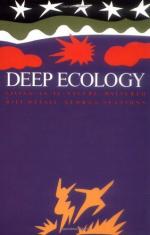|
This section contains 899 words (approx. 3 pages at 300 words per page) |

|
The term "deep ecology' was coined by the Norwegian environmental philosopher Arne Naess in 1973. Naess drew a distinction between "shallow" and "deep" ecology. The former perspective stresses the desirability of conserving natural resources, reducing levels of air and water pollution, and other policies primarily for promoting the health and welfare of human beings. Deep ecologists maintain that shallow ecology simply accepts, uncritically and without reflection, the homocentric, or human-centered, view that humans are, or ought to be, if not the masters of nature, then at least the managers of nature for human ends or purposes.
Defenders of deep ecology, by contrast, claim that shallow environmentalism is defective in placing human interests above those of animals and ecosystems. Human beings, like all lower creatures, exist within complex webs of interaction and interdependency. If people insist on conquering, dominating, or merely managing nature for their own benefit or...
|
This section contains 899 words (approx. 3 pages at 300 words per page) |

|


